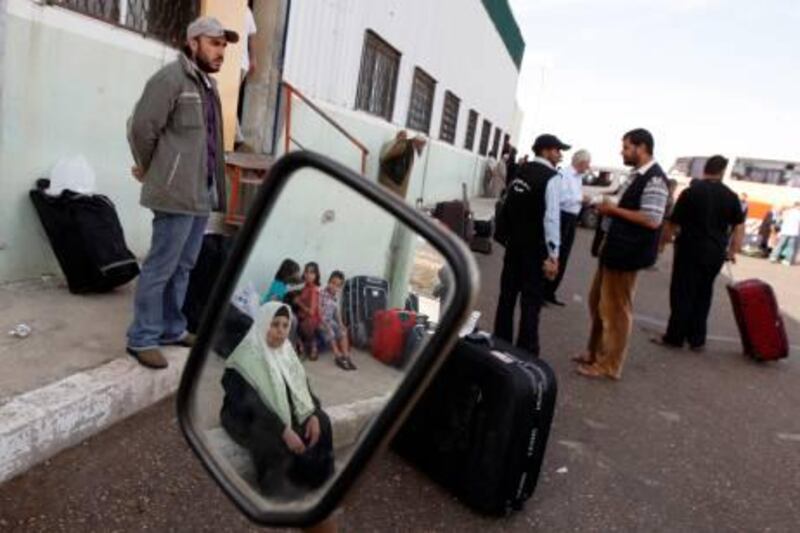RAFAH BORDER CROSSING, THE GAZA STRIP // Twice this month, Samah Ahmed, 30, tried and failed to enter Egypt. In her first attempt, she said, Egyptian border agents turned her back for lacking "proper co-ordination". The second, on May 26, failed for reasons she does not fully comprehend.
Yesterday, though, Ms Ahmed was on hand when the creative director for a group of Gazan artists stepped onto a bus at the Rafah border crossing and into what for many in this war-ravaged, isolated Palestinian enclave anticipate could be a new era of hope. Ms Ahmed, who was stopped each time she tried to cross previously by an Israeli blockade administered by Egypt on her native Gaza, was one of about 450 Gazans attempting to travel to Egypt yesterday under relaxed border restrictions introduced by the country's interim military rulers.
"I've come here to see with my own eyes if Egypt will do what it says it's going to do," she said, quipping that "if they send me back again, well, I guess I'll have another story to tell."
Ms Ahmed, along with students, people seeking medical treatment and some non-Palestinian Arabs, eventually made it through after a relatively short queue at the crossing terminal in southern Gaza.
The run-up to the border opening generated much attention here, drawing swarms of journalists documenting the inaugural passage into Egypt yesterday. Palestinian politicians boasted in front of television cameras that four years of Israel's US-backed attempt at isolating Hamas had failed.
"This is a significant day for the world," announced Ghazi Hamad, Hamas's deputy prime minister. "Enough of the siege and the collective punishment of Gaza."
Palestinians hope the May 4 reconciliation accord between Hamas and the West Bank-based Fatah will yield benefits beyond the opening of the Rafah border.
Fanning these hopes was an announcement on Thursday by the Palestine Investment Authority of planned reconstruction projects for Gaza worth $1 billion (Dh3.67). The funding is partly intended for the tens of thousands of homes still in disrepair from Israel's 22-day war on Gaza in 2008, known as Operation Cast Lead.
In Israel, the country's main opposition, Kadima, capitalised on the development, accusing the ruling coalition of Prime Minister Benjamin Netanyahu of endangering Israeli security by not preventing the border opening.
"The Rafah border was opened for the first time in direct opposition to Israel's interests," the Kadima party said in a statement.
Israel imposed heavy sanctions that included severe restrictions on incoming goods and construction materials after Hamas, which is considered a terrorist group by the US and European Union, violently took control of Gaza in 2007 from the Palestinian Authority. Israel has long feared weapons imports from Egypt to the Islamist group but has failed to curtail its increasing power.
"Netanyahu's government talks a hard line against Hamas, but in reality during the time of its leadership, Hamas has become stronger than it has ever been in the past," the Kadima statement added.
Mr Netanyahu's office appears to be responding cautiously, declining to comment yesterday on the border opening.
The issue is poised to further strain Israel's relationship with Egypt's transitional military government, which has come under popular pressure to alter its relationship with Israel and adopt a more pro-Palestinian policy.
Hosni Mubarak, who was overthrown by nationwide demonstrations in February, played a crucial - and highly unpopular - role in helping to impose Israel's Gaza blockade.
After years of decrying Egypt's role in isolating them, Gazans yesterday still seemed uncertain whether they would actually be allowed to pass into Egypt from the Rafah crossing.
"The bureaucracy has been so difficult on the Egyptian side," said Halema Radwan, 51, who was preparing to travel to Cairo for medical treatment.
"Sometimes we'd wait from 10 in the morning to three in the afternoon just to get through. God willing that won't happen today." Still, she added, "All of Gaza is happy today."
While officials expect as many as 1,000 people to pass through the border, about 450 had showed up by midafternoon.Some said it was the result of final examinations for primary and secondary school students, which would have delayed family travel. For others, it was a matter of wait-and-see.
"People don't have confidence in what the Egyptians are saying, so they want to wait and see first if things will change," said Abdulnasser Ajrami, 51, a bakery owner in Gaza City who did not attend the border opening.
He also said the severe economic hardship inflicted on Gazans by the blockade would make it financially difficult for many to travel abroad. Many are uncertain if a much-needed influx of construction materials and everyday goods will follow the border opening. "People will have to see job opportunities and money before they can think of travelling again," said Mr Ajrami.
Yet there were signs of economic vibrancy at the Rafah terminal yesterday. Among these encouraging signs were vendors hawking mobile phone chargers and snacks to the Egypt-bound passengers.
Fathi Ragheb, 51, a self-described money changer who can also get "whatever you want", said he exchanged about 1,200 Egyptian pounds (Dh740) to the passengers, as well as selling two mobile phone sim cards and two phone chargers.
"This would have been normal for the entire day," he said by midmorning, holding a thick wad of cash in his right hand. "Things are picking up."





